The silent teachers - the people who donate their bodies to science
- Published
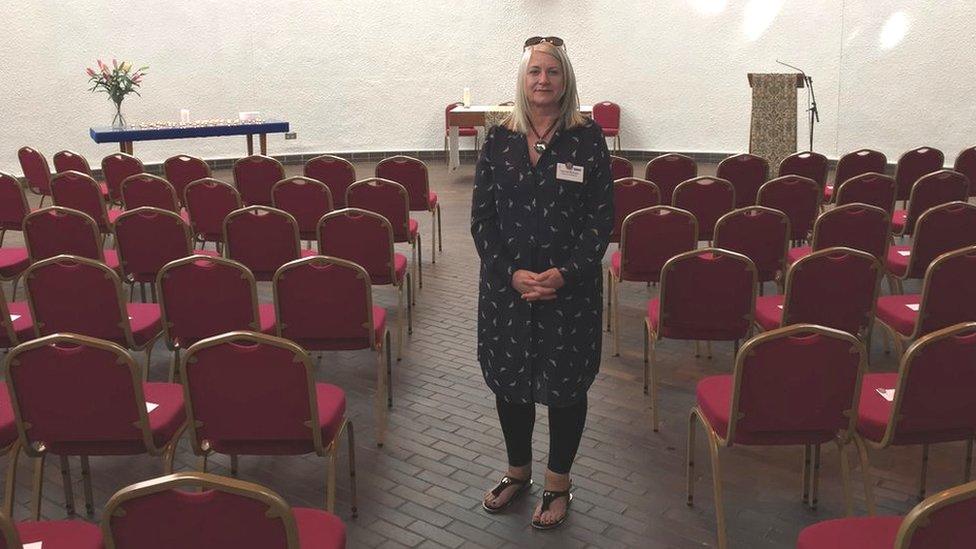
Vivienne McGuire said she is guided by the families wishes "every step of the way"
To their grieving families, they are mum, dad, brother or sister. To the students, they are the silent teachers.
Scores of men and women donate their bodies to Dundee University in the name of medical science every year.
They give, in the words of university chaplain, Dr Fiona Douglas, "the gift of humanity", and provide an invaluable learning opportunity for future doctors and surgeons.
The absence of a traditional funeral in the days following their loved-one's death can make the decision to donate difficult for some relatives.
The university's annual service to honour the silent teachers may provide consolation.
Thanksgiving service
It is a sunny Friday morning in May and mourners are gathering at the university chapel.
The thanksgiving service is organised by the university's Centre for Anatomy and Human Identification (CAHID). Staff and students mingle with the families.
The department's book of remembrance records six names for 1968 - this year there are 84.
One of those is Martin Killiner, who died in 2016.
His sister Diane Burgess has travelled from North Wales with her husband to attend the service.
She said she was aware of her brother's wish to donate his body and supported his decision.
She said: "I think his reason was just because he felt it was a good thing to do.
"He had a cancer and I think he thought it might be educational for the students to see what it looked like."
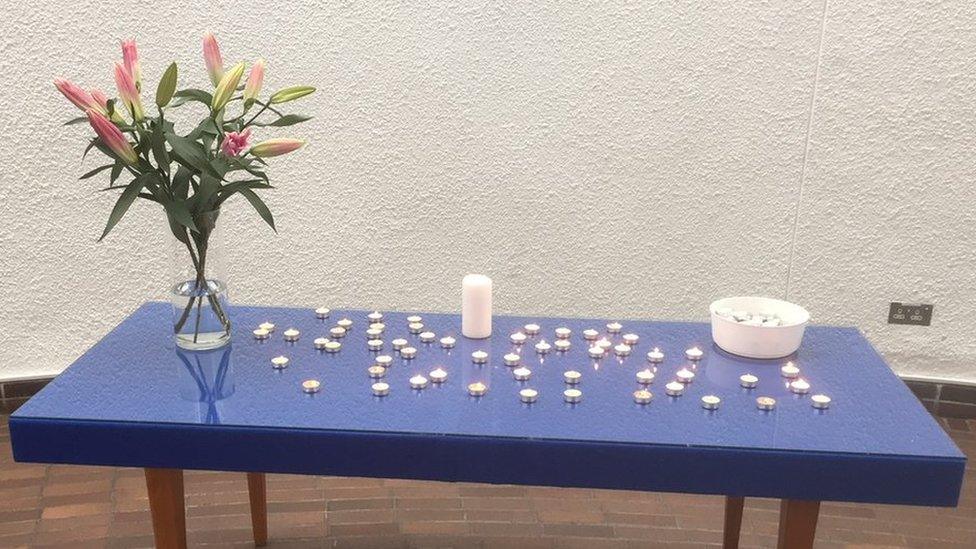
Relatives can light a candle for their loved ones at the thanksgiving service
In the days following her brother's death, Mrs Burgess said she felt that she "hadn't thought through the implications" of his decision.
She said: "There we were, he had passed away, his body had been taken away from the hospital, and there was nothing for us to do then.
"It's not like organising undertakers and flowers and everything.
"It felt that the space was there, quite empty, and I didn't have anything to fill it with."
Mrs Burgess said she hoped the Dundee service would provide closure.
She said: "I feel that it will have happened once we've gone away and been able to process it a bit.
"I had a very difficult time after he died because I'd got this picture in my head of him in his last few minutes, struggling, fighting for breath.
"It was horrible and now I have something else to put in place.
"I love that phrase, silent teachers. I think it's a very emotive thing and I shall remember that."
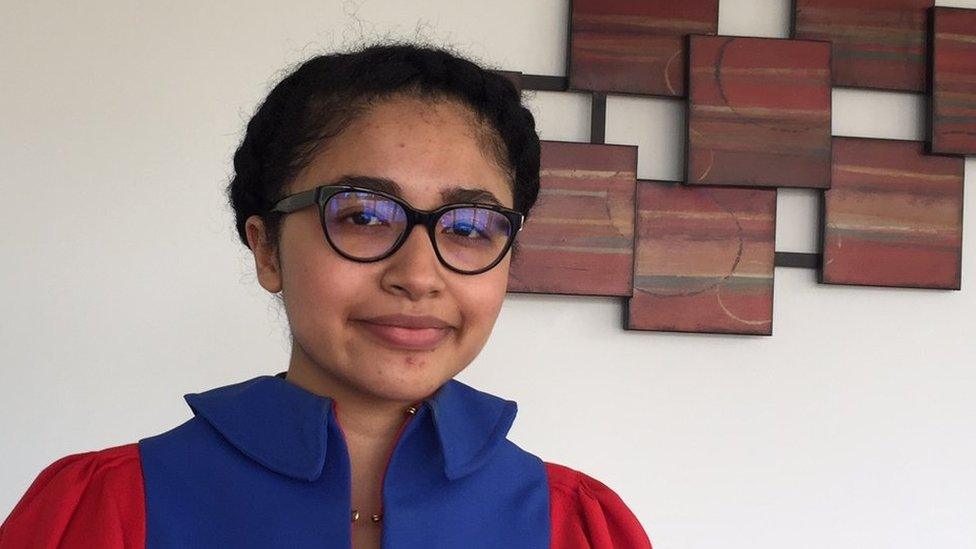
Student Magd Nojoum said the thanksgiving service was "very moving"
One of the silent teachers' pupils is second-year medicine student Magd Nojoum, who gave a reading at the thanksgiving service.
She said: "When you go in and speak to people, especially terminally ill patients, it's such a big aspect of being a doctor.
"I wanted to see the whole process that the silent teachers go through, where they come from and who they're connected to.
"I feel a lot of gratitude to the people and their families, it is such a big gift.
"It's such a huge thing to give to students. It's very moving as well."

The process of donation
Forms must be completed and signed by the potential donor, who must be fully informed of the process. A third party cannot complete the form.
Following their death, and providing their family does not object and carry out their own funeral arrangements, the donor's body is taken by private ambulance to the university mortuary, where it is embalmed.
CAHID uses the Thiel embalming method, which leaves the bodies flexible and the tissues supple, unlike traditional Formalin embalming where the bodies are fixed and rigid.
Before any student or surgeon can work with the bodies they must sign a form to demonstrate compliance to "safeguard the respectful treatment of the cadavers and the responsible use of this invaluable resource."
The bodies are referred to by numbers throughout their entire time in the university to maintain the donor's anonymity.
By law, a body may only be kept for three years before being returned to the family, or cremated by the university.
The May funeral service is for the families of the donors whose bodies or remains are being returned that year.

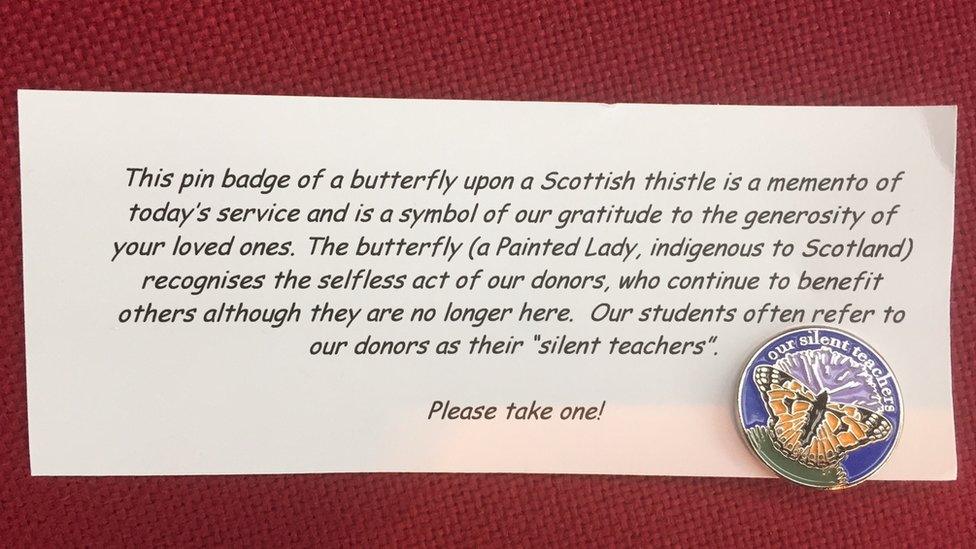
Families attending the service are given a badge honouring the silent teachers
CAHID director Prof Dame Sue Black said generations of local families had been known to donate their bodies to the university, for a variety of reasons.
Prof Black said some people wanted to pay back the medical profession and others did not feel a spiritual need for burial or cremation.
"For some individuals, it's that they're not prepared to pay £5,000 or £6,000 for a funeral that could go to their grandchildren's education, and they'll do it for that reason," she said.
"We often find families don't necessarily understand why dad or mum did this and they're perhaps not happy, but by the end of the service they say they did the right thing."
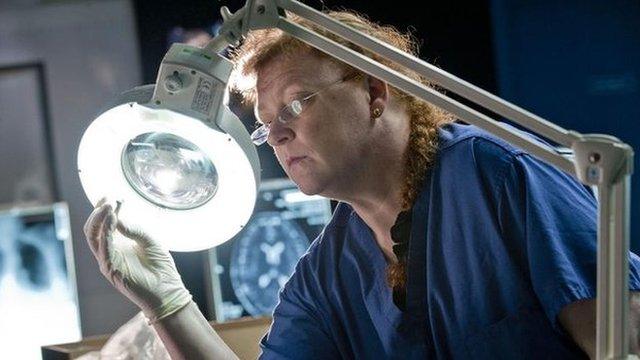
Prof Dame Sue Black said donation was a family tradition for some local people
Dundee University's bequeathal manager Vivienne McGuire receives about 10 calls every week from people interested in donating their bodies to CAHID.
The most common question is if the person can remain an organ donor.
She said: "Yes - we always advocate organ donation because it literally will save a life.
"Because the conditions for organ donation are quite narrow sometimes, it's not always possible for it to happen.
"So, if a person is registered as a body donor then they have the back up of that."
Not everyone who completes the bequeathal forms will become a donor.
"I have a whole filing cupboard full of declaration forms and some of these people will probably already be dead," she said.
"At the time of the death maybe the family haven't agreed with it or couldn't cope with making that decision to give their relative to CAHID.
"We would never pressure a family into doing something they were uncomfortable with."
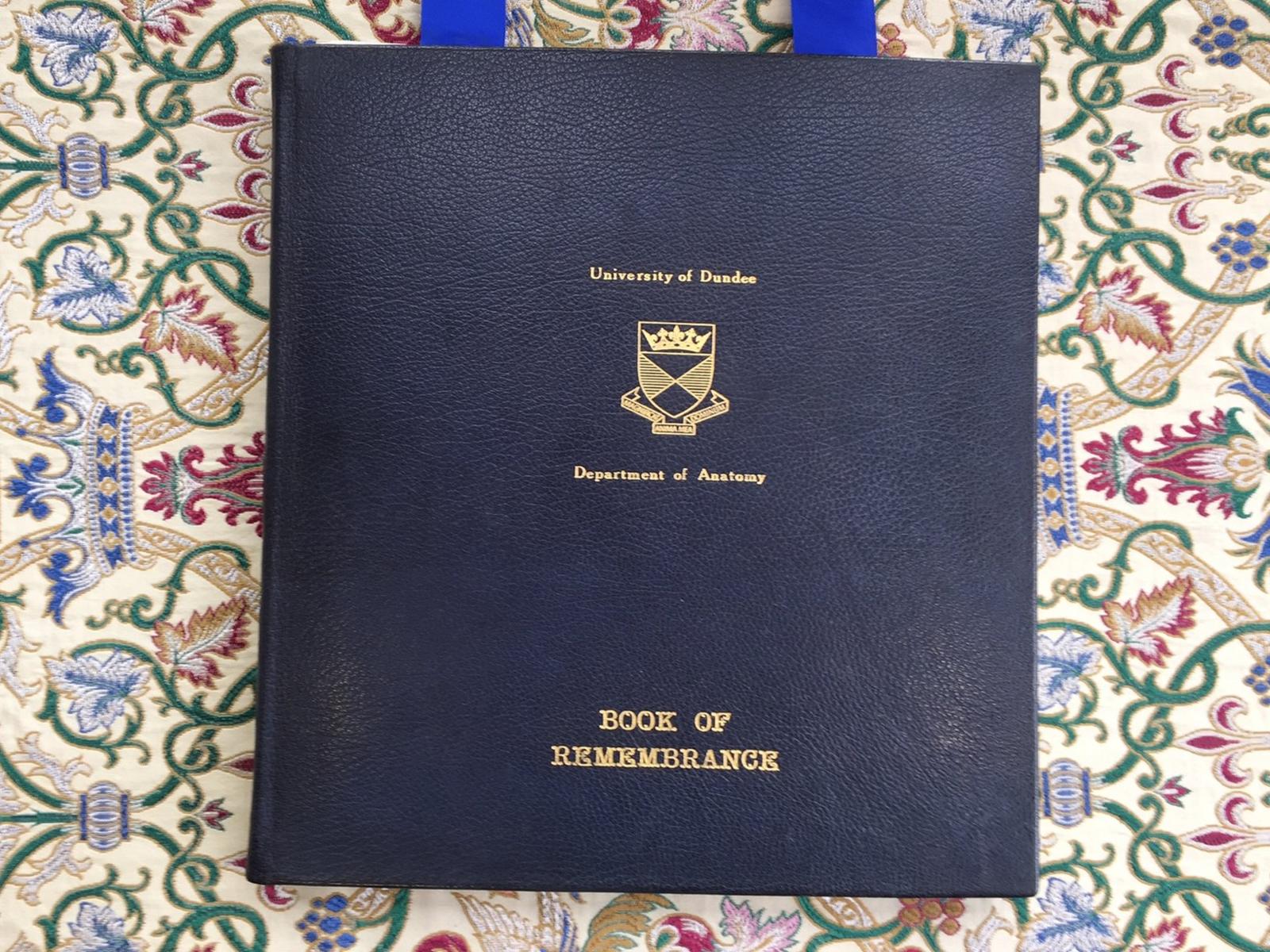
The 1968 entry contains six names - this year there are 84
The body contained in the coffin present during the thanksgiving service is that of a donor whose friends and family are not in attendance.
Mrs McGuire said not every family wants to attend.
She said: "Some people see it as a finality - the person's been donated, they don't want to be informed of the service, they don't want the ashes back.
"It could be three years down the line that families are having to wait to come to the service.
"It's probably more difficult for the families. The donors have been very pragmatic, the decision was something they wanted to do.
"But it's their loved ones that are left behind to cope with the actual practicalities, so we try to make it as simple for them as possible and we'll be guided by their wishes every step of the way."